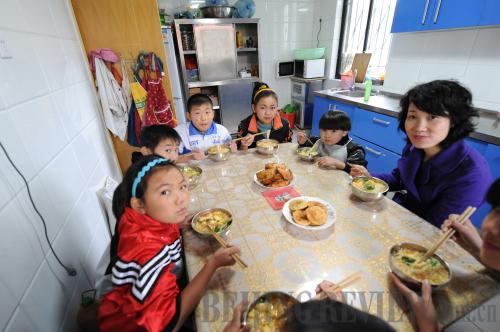|
 |
|
A HAPPY FAMILY: A mother and her children in the SOS Children's Village in Kaifeng, central China's Henan Province, have dinner on October 31, 2009 (QI LIN) |
Another major reason that mothers and assistants are difficult to recruit is their low pay, said Li.
Mothers and assistants are paid by the SOS Children's Villages International. New mothers are paid 2,650 yuan ($420) per month, while an assistant is paid 1,100 yuan ($174) monthly in their first year and 1,300 yuan ($206) monthly in the second year. Li admits that the salaries are not attractive because of soaring prices in China.
Mothers have to work for at least 20 years and be at least 55 years old to enjoy retirement benefits from the SOS Children's Village International.
When the SOS Children's Villages first operated in China in the 1980s, the pay to mothers was impressive because at that time, Chinese people's overall income was low, said a staff surnamed Wang at the SOS Children's Village in Yantai, east China's Shandong Province.
Back then, the SOS motherhood was particularly appealing to rural women because mothers automatically got permanent urban residency. "Now, it is easier for rural residents to get urban residency, and the urban household registration status is no longer associated with many privileges, so it is no longer very attractive," he said.
Although Wang agreed that it is more difficult to recruit new mothers now, he did not see high turnover among existing mothers in the facility in Yantai.
"Whether mothers stay in the job for long depends on whether they really understand their goals. Those who have made up their mind to take good care of the children are devoted to the job," Wang said.
Among the 16 mothers in the SOS Children's Village in Yantai, at least five to six mothers have worked there for more than 25 years, and even the youngest one has worked there for more than five years now.
Mother Zhang Yuxiao was one of the mothers who came to the village in 1986. She once worked as a primary school teacher and a rural doctor. A dedicated mother who has raised 19 children, Zhang was named one of the Top 100 Excellent Mothers in China in 2007 by the All-China Women's Federation.
The China Association for SOS Children's Village said that it is discussing with SOS Children's Village International about relaxing recruitment standards.
On May 3, Li announced that SOS children's villages across China are recruiting short-term mothers. Li said from last year, mothers and assistants' annual leave has been extended from 60 days to 80 days. Every village is allowed to recruit two additional mothers or assistants to fill in the gap.
But so far, many mothers can't yet take the extended leave because new assistants have not been recruited in most children's villages, Li said.
Li said that they now want to recruit volunteer mothers serving only two-year terms, and require them to remain single only during the service period.
In regions with local regulations on volunteer services and volunteer organizations, volunteers can be recruited to substitute mothers and assistants, said the China Association for SOS Children's Village in a regulation posted on its website.
By being more flexible in its recruitment strategies, Li hopes to engage more people and attract high-quality applicants to help orphans and needy children.
SOS Children's Villages in China
SOS Children's Village International was founded by Hermann Gmeiner in Austria after World War II to provide war orphans and homeless children a family-like environment.
Chinese Ministry of Civil Affairs and the SOS Children's Village International reached a cooperative agreement in 1984 to establish adoption communities in China. In nearly three decades, such facilities were set up in Tianjin, Yantai in Shandong Province, Qiqihaer in Heilongjiang Province, Nanchang in Jiangxi Province, Chengdu in Sichuan Province, Kaifeng in Henan Province, Putian in Fujian Province, Urumqi in Xinjiang Uygur Autonomous Region, Lhasa in Tibet Autonomous Region, and Beijing.
Moreover, affiliated facilities such as SOS youth apartments, kindergartens, social centers, and the like have also been built in the villages. In Yantai, the SOS Hermann Gmeiner Middle School was also established to provide education for children from the SOS Children's Village.
As of the end of 2011, a total of 2,263 children (including those who have grown up and left) had lived in SOS children's villages in China. Among these children, 225 have received two-year college education and 120 have studied in Chinese and foreign universities.
(Source: China Association for SOS Children's Village)
Email us at: wanghairong@bjreview.com | 